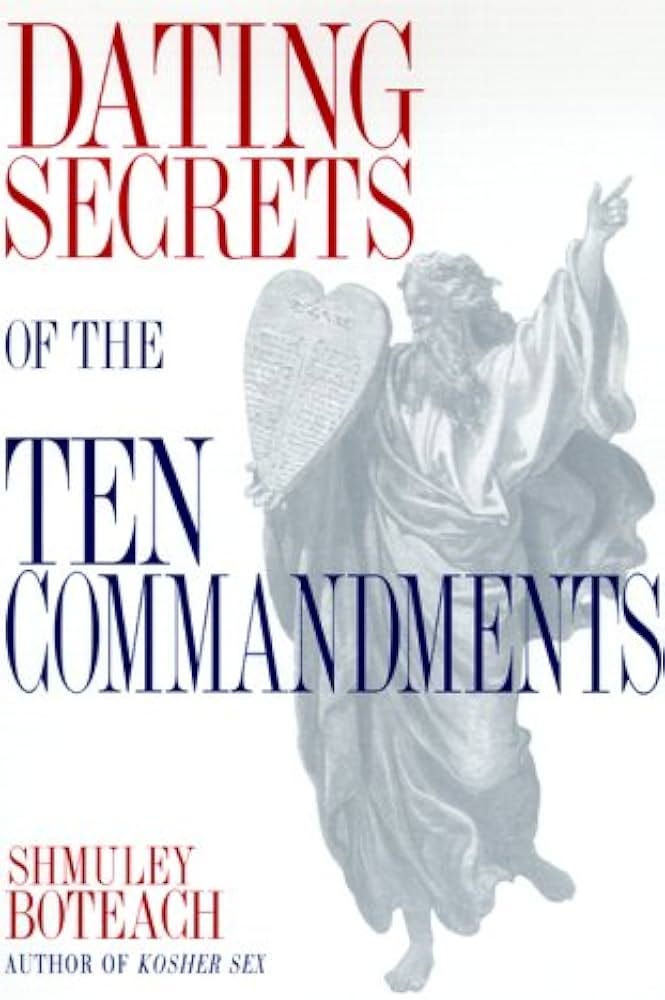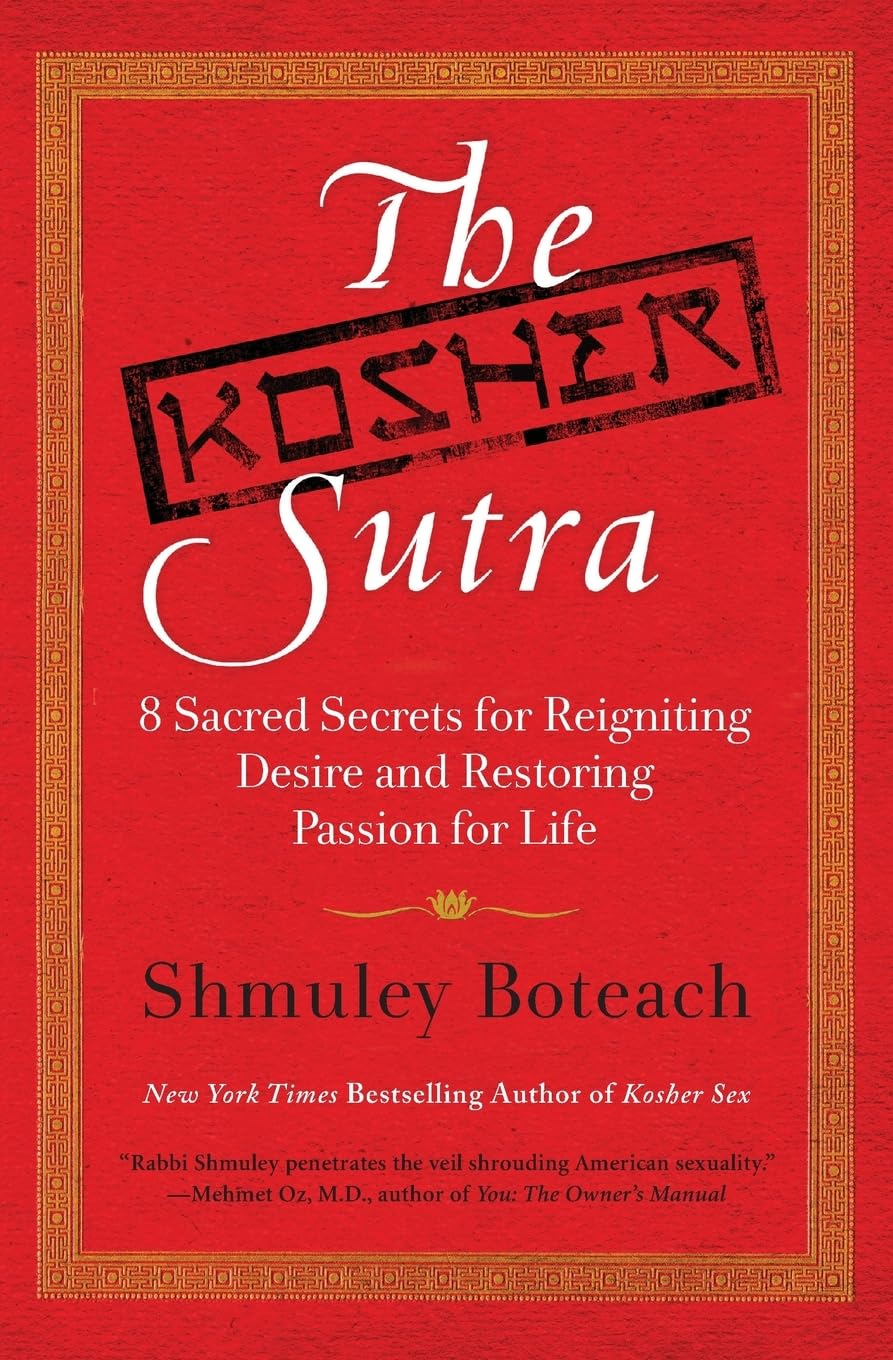Self-help review: The Kosher Sutra by Shmuley Boteach
Oy vey
God gave 10 commandments at Sinai, and the 11th commandment, which they expunged but which has come down orally, is 'Thou shalt do anything for publicity and recognition.'
—Shmuley Boteach
Shmuley Boteach isn’t a regular rabbi—he’s a cool rabbi. He had his own reality TV show, was crowned (ordained?) Great Britain’s 2000 “Preacher of the Year” (out of clergy of all faiths), and at different points managed to be both a close personal friend and bitter enemy of Michael Jackson. And oh, yeah, he also publishes self-help books with titles like The Kosher Sutra, in which he implies far more about his sex life than I ever wanted to know.
And I read a couple of them! Specifically, Dating Secrets of the Ten Commandments and The Kosher Sutra: 8 Sacred Secrets for Reigniting Desire and Restoring Passion for Life. But the man is prolific. Other gems include Lust for Love: Rekindling Intimacy and Passion in Your Relationship (co-written with Pamela Anderson), Kosher Sex: A Recipe for Passion and Intimacy (serialized in Playboy), and Kosher Lust: Love Is Not the Answer. (You may be sensing a theme at this point.)
Anyway—here’s a review of the two I read.
Dating Secrets of the Ten Commandments
Show your date that you have some core beliefs by mixing some religious traditions into the date.
Sacrifice animals together in the comfort of your living room.
This book is aimed at straight people looking to get married—though it oddly includes a section trying to convince readers that marriage is worth wanting in the first place. (If they’ve already picked up a dating self-help book by a rabbi, isn’t that battle won?)
The main gist is simple: be a wholesome, decent human being who isn’t shallow, and look for someone similarly inclined. As advice, it’s unobjectionable—probably even helpful for some. But it also sidesteps the reality that “shallow” traits, like physical attraction, do matter in dating. That’s a surprising omission from the man who, in other books, argues that lust is more important than love for long-term relationships.
Shmuley also attempts secular arguments for religious practices, like abstaining from sex before marriage. These arguments aren’t especially convincing. It feels like he started with the conclusion and reverse-engineered the reasoning—probably because he did. While he tries to keep things general, the book seems better suited to a conservative religious audience already aligned with his worldview.
The most intriguing part, to me, is his rejection of self-actualization and self-love. For example, he argues that people shouldn’t aim to be “complete” on their own, but rather find someone who “completes” them. He also cautions against always holding out for someone better or insisting on a partner who matches your accomplishments. At times, though, he seems to be talking past the advice he critiques. When mainstream dating advice tells you to be “complete,” I think it means “not insecure”—a point Shmuley also makes, just in different words.
As an aside: He writes that agreeing to polyamory or open relationships is sign of low self-esteem. I find this remarkable given that I’ve heard poly people say the same about monogamy.
Best advice: Follow up a compliment with a question, so the other person doesn’t feel awkward.
Worst advice: Avoid talking about movies, the weather, your sex life, your friends, your parents, your childhood, or “any other depressing topic” on a date. Instead, talk about “life”—which apparently excludes all of the above.
Overall grade1: C. Most of the good tips you can get elsewhere. Most of the bad tips are Shmuley originals.
The Kosher Sutra
But to the extent that in marriage we sometimes have heated arguments and our inner rage is about to be let loose, think to yourself, This is the perfect opportunity for erotic sex. Rather than allowing myself to blow a gasket at my spouse and have some stupid argument, I’m going to use that swelling passion to create glorious intimacy. And then channel that swelling anger into sexual passion. It works. Your spouse will be confused that you looked so angry a moment ago and now you want to make passionate love to them. So explain it. “I was getting angry. But whenever I feel intense emotion, it brings to life this inner animal in me that just wants to take you because I need you so badly.”
This one’s for straight married couples whose sex lives have stagnated, and who want to reinvigorate things within the bounds of marriage—and Shmuley has nine kids, so presumably something he recommends worked at least occasionally. Compared to Dating Secrets of the Ten Commandments, this book is lighter on practical self-improvement tips and heavier on shared partner exercises. The tone is also more flowery, less funny, and, for me, less enjoyable overall.
Many of the suggested exercises revolve around imagined cuckoldry: the husband asks about his wife’s past sexual experiences, or watches her in settings where other men desire her, or some variation on those two themes. (But never, under any circumstances, the reverse—husbands should not disclose their attraction to other women.) Other exercises focus on stoking desire without climax. There’s also some mention of being presentable—like women wearing lingerie—but once again, Shmuley glosses over the fact that overall physical attractiveness matters too.
Best advice: I didn’t find the exercises particularly inspiring, but I have to admit that I didn’t try any of them. Maybe I overlooked some gems. But absent that, I think his best advice is to spend quality time with your spouse. Basic, I know.
Worst advice: This might not be the worst for everyone, but I had the strongest visceral negative reaction to his suggestion that husbands install a webcam in the bedroom. The wife should know it’s there, just not when he’s watching. I made my husband promise never to do this.
That said, a close runner-up is Shmuley’s fixation on having women elaborate on their exes—whom they still miss, whom they considered “husband material,” and so on. In couples where intimacy is already fragile, this seems likely to backfire. The obsessive focus makes me wonder whether Shmuley is projecting his own preferences onto other people.
Overall grade: D. Low on content, so the bad tips were a large percentage of the total.
Bonus material: While reading, I couldn’t stop thinking how awkward this must be for his kids. Their dad has written extensively about what he wants to do to their mom, or what he enjoys imagining other men doing to her. But not all his kids seem to mind. One daughter opened a Jerusalem sex toy shop called Kosher Sex (named after his most famous book). She also runs a webshop at the (awesome) domain kosher.sex, once had a podcast by the same name, and even featured her dad on it. There’s a video on the site where he discusses whether BDSM is kosher.
Conclusion
So—should you read either of these books?
Maybe, but probably not.
Their best case, compared to other similar self-help books, is if you’re looking for a religious guide to relationships without the prudishness that can sometimes imply. Or if you’re already into tantric sex, but concerned about idolatry.
I’m not sure how many people that is.
I scored each book by gathering all the practical, actionable pieces of advice, rating them as either ‘Good’, ‘Bad’, or ‘Meh’, and calculating a score using the formula:
Dating Secrets of the Ten Commandments had 62 Good, 25 Meh, and 13 Bad tips for a total score of 75%. The Kosher Sutra had 24 Good, 21 Meh, and 10 Bad tips for a total score of 63%.



